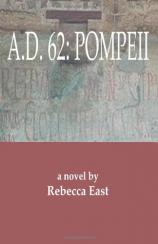Interview: February 2003
Q: The setting of your book (which I thoroughly enjoyed!) is Pompeii, just before Mount Vesuvius blew. Have you seen Pompeii and what was it like?
RE: Most parts of Pompeii are just the skeleton of a city: streets and walls and doorways. It's crowded with tourists and stray dogs, and choked with weeds and dust. Unfortunately, the ruins are gradually being destroyed by exposure to the weather, and souvenir takers, and the wear and tear of more than two million pairs of feet a year.
And yet there are places that are absolutely magic: you enter a courtyard and see a mural of Venus, and a few shrubs and plants, and from that you can picture what it must have looked like when people lived there. I found it helpful to bring along books such as the "Then and Now" picture books, that pair a photograph of the ruins as they look today with an overlay painting that reconstructs what was once there.
I've visited three times, and I haven't seen everything yet; many of the houses are locked and off limits to visitors; all you can do is peer through the gates. In some respects, a visit to Ostia is more rewarding; that's the old port of Rome. Ostia is less popular with tourists and some of the buildings are in better condition. The material that made Pompeii truly wonderful as an archaeological find--the artifacts of everyday life such as dishes, jewelry, tools--was mostly taken to museums.
Q: When did your story appear to you and how long did it take you to write it?
RE: Like many people, I've always wanted to write a novel; but I never had a story to tell before. Several things came together. My husband was teasing me; I spoke of wishing to go back in time to see Pompeii in its heyday, and he said "A little woman like you wouldn't last a day in the ancient world." That got me started thinking: what would it take to survive? I also overheard a woman in the book shop at the gate to the Pompeii excavation; they sell many scholarly books about archaeology, but not much to answer the question she asked: "What did they do in those houses?" My first visit inspired me to start collecting books about the ancient world, and the details about daily life fascinated me; and I wanted to weave that information into the story.
The story didn't appear to me all at once: I started with the beginning (a female time traveler stranded in Pompeii) and the end (which I won't reveal here), and then tried to imagine the events that would lead from one to the other. Often I was stuck. I would be out taking a walk, or digging in the garden, and suddenly I would see a scene (such as the one in which Miranda's hair is cut off). Then I ran back to the word processor to write it out in detail. Then I needed to decide where each scene belonged in the sequence of events. I did a lot of rewriting and rearranging. Most of the writing was complete after about a year and a half of nights, weekends and holidays. I have no idea how many hours went into the project: certainly a great many!
Q: In this time travel adventure, modern Miranda wishes she were a heroine. What qualities does a woman from the present have to have to be a heroine in the past?
RE: She needs the courage to face the unknown and to ask more of herself than she previously thought she could do; and willingness to learn from her mistakes. Gradually, Miranda became less self-centered and more concerned with the welfare of others. These are the same qualities it takes to be a heroine in any time period, I think.
Q: What do you think is the one reality modern women would have the most trouble with living in that day and age?
RE: Slavery was something people took for granted in the ancient world. Many slaves had miserable lives of overwork, beating, malnutrition, and misery. But, as Miranda realizes in her musings: we haven't entirely gotten rid of those evils in the modern world, either.
Q: Yes, 9-5ers are slaves to the paycheck, and whole countries are riddled with violence and malnutrition just so some elite can live in luxury. What do you think is the one thing from that long-ago time we could do well to remember?
RE: The Romans wrote, and built, with posterity in mind; they wanted the things that they created to last forever and in fact, there is a Roman aqueduct near Segovia that still provides some of that city's water; there are Roman roads still in use; and we still read the words of Cicero, Catullus, and many other writers from that period. By contrast, much of what we modern people build is intended to wear out quickly: our roads and houses have design life times of 30 to 50 years. We are a throw-away society, and quite wasteful.
I think we might do well to think about the future more than we do; and to act, and build, and write, in the hope of leaving something of value for the people who come after us.
Q: In England, where I came up, there are still Roman aqueduct bridges and portions of Roman roads to see. What would you like readers take away from your story?
RE: I'd like readers to come away with a sense that the stories we believe in can become self fulfilling prophecies. Miranda tells the story of Dick Whittington's cat early on; it's a story about a servant who works hard and eventually finds success and love. She doesn't realize it at the time, but that story foreshadows her own life. Of course, having a dream is just the beginning; things don't happen by themselves; we have to do things to make our dreams come true. But having a vision of where we want to go and what we want to be can help us to make things happen.
Q: Are you at work on another book?
RE: Yes, I have several stories in mind. One set of stories follows Marcus and Miranda through the events of the next several years: the great fire in Rome, the year of four emperors, and the eruption of Vesuvius. I have ideas for other stories that are straight historical fiction (without time travel).
Writing fiction was hard work, of course, as any writer will tell you. But it was also enormous fun. As I write the story unfolds for me and it's often a surprise to see what develops. I can hardly wait to see what happens next!
Excerpted from A.D. 62: Pompeii © Copyright 2012 by Rebecca East. Reprinted with permission by iUniverse. All rights reserved.








